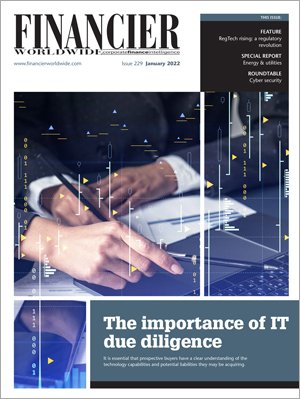Anti-corruption compliance and enforcement trends in the US and beyond
January 2022 | FEATURE | FRAUD & CORRUPTION
Financier Worldwide Magazine
Despite slowing over the past couple of years, the fight against bribery and corruption in the US looks set to gather pace under the Biden administration.
2020 was a landmark year for Foreign Corrupt Practices Act (FCPA) enforcement in the US. Several record fines were issued as US-recovered penalties from corporate resolutions totalled more than $2.75bn, the highest on record. The largest fine in FCPA history saw Goldman Sachs and its Malaysian subsidiary reach a $2.9bn global settlement related to three bond offerings structured and arranged for Malaysia’s state development fund, 1MDB. The amount included a record $1.26bn criminal penalty to the Department of Justice (DOJ) and a $400m civil penalty to the US Securities and Exchange Commission (SEC), as well as $606m in disgorgements.
2021, however, was relatively quiet in terms of FCPA enforcement. In the first quarter, the SEC and DOJ filed three FCPA-related enforcement actions and announced one previously filed action. In the second quarter, the DOJ filed three FCPA-related enforcement actions and announced three previously filed actions, while the SEC filed only one new action. In the third quarter, the DOJ filed two FCPA-related enforcement actions and announced one previously filed action.
WPP plc, the world’s largest advertising group, agreed to pay more than $19m to settle charges that it violated the anti-bribery, books and records, and internal accounting controls provisions of the FCPA in connection with violations at its subsidiaries in India, Brazil, China and Peru.
Amec Foster Wheeler Ltd agreed to pay $22.7m to settle SEC charges that it violated the anti-bribery, books and records, and internal accounting controls provisions of the FCPA in connection with a scheme to obtain an oil and gas engineering and design contract from Brazilian state-owned oil company Petroleo Brasileiro S.A.
The SEC charged Asante Berko, a former executive of a financial services company, with orchestrating a bribery scheme to help a client to win a government contract to build and operate an electrical power plant in the Republic of Ghana.
“Despite the sluggish pace of enforcement activity, the Biden administration has reaffirmed the need for increased activity going forward.”
And Deutsche Bank AG agreed to pay more than $43m in disgorgements to settle charges that it violated the books and records and internal accounting controls provisions of the FCPA in connection with improper payments to intermediaries in China, the UAE, Italy and Saudi Arabia.
Enforcement momentum
Despite the sluggish pace of enforcement activity, the Biden administration has reaffirmed the need for increased activity going forward. The administration has placed additional emphasis on anti-corruption, so it remains a key priority within the DOJ and SEC’s enforcement programmes.
In June 2021, the Biden administration issued a National Security Study Memorandum – the ‘Memorandum on Establishing the Fight Against Corruption as a Core United States National Security Interest’ – instructing federal agencies to prioritise the fight against corruption both domestically and abroad. The memorandum links corruption to a series of societal problems – ranging from economic stagnation to widening inequality to public distrust of government – highlighting the danger to national security when corrupt regimes flourish.
The central elements considered in the memorandum are increased interagency cooperation and transparency, improved international collaboration and robust enforcement of anti-corruption laws. It instructs federal agencies and departments to prepare a report detailing their strategy to combat corruption.
The administration also proposes to increase the budget and staffing of the US Department of the Treasury’s Financial Crimes Enforcement Network (FinCEN), the country’s financial intelligence unit tasked with enhancing government coordination, by $60m and 80 employees, an increase of 50 percent and 25 percent, respectively. The proposed increases are intended to boost FinCEN’s ability to implement key provisions of the 2020 Anti-Money Laundering Act (AMLA).
The Biden administration also plans to create a registry containing information on the beneficial owners of US legal entities and to find ways to reduce avenues to launder corrupt funds through real estate.
Beneficial ownership has been a key area of interest around the globe. The recently published ‘Pandora Papers’ identified 700 companies with beneficial owners connected to the US. Americans were among the top 20 nationalities represented in the data. Russia, the UK, Argentina, China and Brazil were among the countries with the largest representation of beneficial owners.
Corporate compliance policies
With enforcement activities likely to increase in the post-pandemic era, including cross-border government investigations, it is imperative that companies re-examine their internal compliance policies and procedures, risk control systems, compliance management and execution teams. They should also regularly review the compliance risks they face across different jurisdictions and assess their exposure. Enlisting the support of external professionals can help.
Ultimately, companies need to ensure their compliance programmes are up to the task of detecting and preventing misconduct. Appropriate plans should be in place to respond to suspected or actual corrupt activities.
All counter-fraud processes should be dictated by a comprehensive risk assessment, to check they are proportionate and tailored to specific risks. The consequences for companies, and increasingly their directors and officers, that fail to tackle corruption can be severe.
© Financier Worldwide
BY
Richard Summerfield


